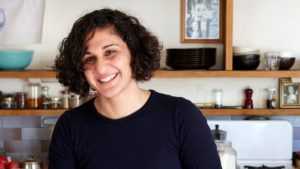January 25, 2019

Samin Nosrat is an Iranian-American chef and food writer. She is a regular food columnist for The New York Times Magazine and has recently had a Netflix docu-series based on her best-selling cookbook, Salt, Fat, Acid, Heat.
Nosrat was born in San Diego, California, November 7, 1979, three days after the US embassy seizure. Her parents had emigrated from Iran to the United States in 1976. She grew up in San Diego eating mostly Iranian cuisine, although she did not learn to cook until she was an adult.
Nosrat remembers the greatest compliment that could be paid to her mother’s food was that it tasted like back in Iran. “What any immigrant is after is a taste of home,” she says. Her mother would pack Nosrat and her twin brothers into the back of their station wagon “and drive us all over southern California looking for just the right bread, feta cheese, cilantro…. It was a single-minded search for taste.”
Nosrat doesn’t consider herself a chef. “The chefs that I learned to cook under were cooks for 30 years before they became chefs,” she says. In the case of a “chef,” the word references a cook who’s moved his or her way up the ranks to run a professional kitchen. “This particular thing, it’s been defined: a chef is this, a cook is this,” Nosrat says. “I’m a traditionalist, so I’m a cook.”
In 1997, Nosrat enrolled at the University of California, Berkeley, majoring in English. She now makes Berkeley her home. As a sophomore, she ate dinner at Chez Panisse, a famous local eatery, and immediately decided to get a job there as a busser.
Nosrat eventually worked her way up to the restaurant kitchen, becoming a cook and working with Alice Waters, who described her as “America’s next great cooking teacher.” After leaving Chez Panisse, she worked in Italy before returning to other Berkeley-area restaurants.
She later worked with Michael Pollan, and was included in his book and Netflix special Cooked as “the chef who taught Michael Pollan how to cook.”
Over almost 20 years working in kitchens, Nosrat observed a pattern to everything she cooked, perceiving that a basic grasp of four elements – salt, fat, acid and heat – are key to building flavor.
Her 2017 cookbook Salt, Fat, Acid, Heat was named “Food Book of the Year” by o “The Times” The Times of London, and has been a New York Times best seller every week since October 14. The cookbook also won a James Beard Award in 2018.
Nosrat became one of the quartet of regular “Eat” columnists for The New York Times Magazine in 2017.
A Netflix docu-series based on the cookbook, also called o “Salt, Fat, Acid, Heat (TV series)” Salt, Fat, Acid, Heat, was released October 11, 2018, with each of the four episodes based around one of the four words in the title. In episode 1, Nosrat goes to Italy to talk about fat in cooking; in episode 2, Japan for salt; in episode 3, Mexico for acid; and in episode 4, the United States for heat. The show was described by The Washington Post as “unlike any other food show on TV.”
Last month she won the 2018 Eater award, bestowed by Vox Media, which called her cookbook, “a serious, thoughtful study that adheres to its use of the word ‘mastery’ in its subtitle.” Hanna Giorgis added in The Atlantic magazine that Nosrat offers “something much more substantial” than recipes to her followers: “a cooking philosophy.”
Nosrat may not be the head of a restaurant kitchen, but her chosen menu — less focused on specific dishes and more about getting people to “start taking the thing you learned, applying it in other situations, and figuring out how to be a better cook” — has landed in homes across the country.
Nosrat is sure that her Iranian upbringing has given her many of the tools for her success – the grafting, the performing, the “comfort-making” qualities of a cook – but admits this comes with a darker side, too. Pleasing people, she says, is at the heart of Persian culture; she mentions ta’arof, the Iranian etiquette that prizes hospitality over all else, no matter the cost, as a way of keeping face. She explains the concept with examples of the extraordinary lengths Iranians will go to this end – calling ahead to pay the bill in a restaurant, even when your bank account is empty; an always-open-doors policy in homes, whatever the circumstances.
At 39, Nosrat says she is still trying to disentangle herself from the web of ta’arof. In an interview with The Guardian of Britain, she said, “The people-pleasing and performing is 100 percent ingrained in me, partly because I was a little brown girl growing up in a very white, homogeneous community in San Diego – where in second grade I was called a terrorist. [I thought] if I’m good, kind, welcoming—whatever—enough, [they will] accept me.”